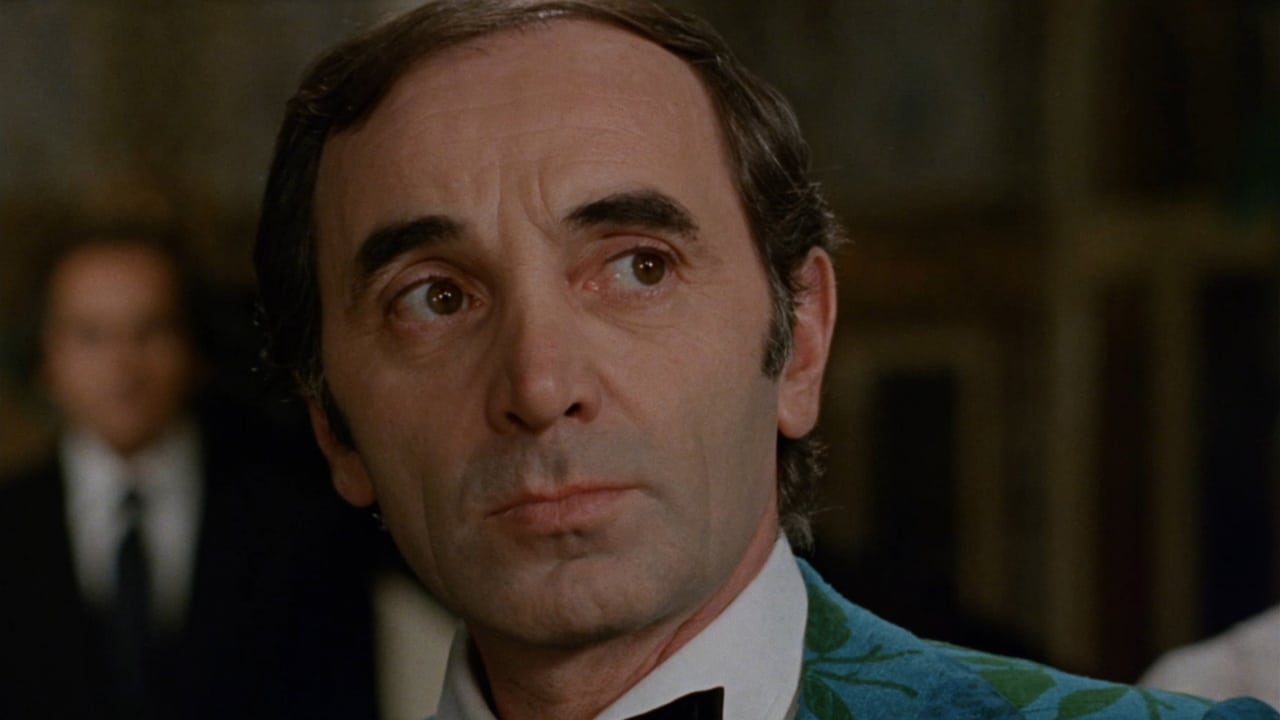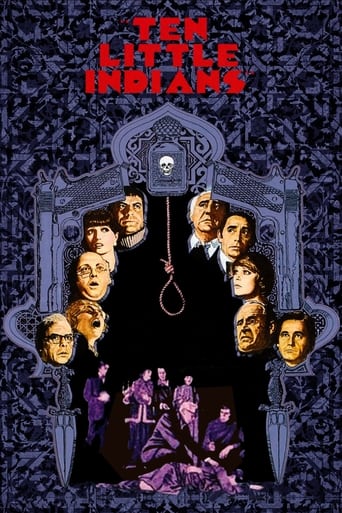

Ten strangers are lured to a luxury hotel in the middle of the Iranian desert. They have nothing in common except that each of them hides a guilty secret; and they have all been invited by a mysterious host, Mr U.N Owen, whom none of them has actually met. The guests are Judge Cannon (Richard Attenborough), private eye Wilhelm Blore (Gert Froebe), ex-serviceman General Soule (Adolfo Celi), actress Ilona Bergen (Stephane Audran), Harley Street's Dr Armstrong (Herbert Lom), secretary Vera Clyde (Elke Sommer), Hugh Lombard (Oliver Reed), entertainer Michel Raven (Charles Aznavour) and housekeepers Martino (Alberto de Mendoza) and Elsa (Maria Rohm). Their host isn't there to greet them, but after dinner a cassette recording bursts into life accusing them all of a past crime. Initially, they treat it as a joke in the poorest of taste; but after Michel Raven has drunkenly sung a rendition of the Ten Little Indians nursery rhyme at the piano, he confesses to a crime before choking on his drink and falling down dead. The others realise that they have been lured to the hotel by a psychopath whose purpose is to deliver retribution for their crimes and, even more terrifyingly, they discover that U.N Owen is one of them...A thoroughly terrible remake of Agatha Christie's superb novel; not because of the change of setting, but because Harry Alan Towers' screenplay (written under his pseudonym of Peter Welbeck) seems little more than a tired rehash of ideas and situations from his previous adaptation of this story, the superior Ten Little Indians (1965), and it is all too predictable. Director Peter Collinson (best film: The Italian Job) creates next to no suspense or tension and his staging of the murders is either indifferent or just plain inept. He is no George Pollock, who directed the unfairly underrated 1965 film version (also written and produced by Towers), nor is he a Rene Clair for that matter who made the highly rated 1945 Hollywood version. However, I actually found that film criminally overrated. The hotel set in the film is simply glorious, and it is a great pity that the film makers did not use it to its full potential since it could have heightened the suspense aspect no end.The quality of the performances from the starry international cast vary from the hopeless, the barely adequate to the promising. But, none of them come close the matching anybody in the previous adaptations, nor, for that matter the 2015 BBC television adaptation. The former Bond villians Gert Froebe and Adolfo Celi, for instance, fail to convince as the private eye and retired ex-army General. Froebe tries but cannot bring the same level of comedic charm that Stanley Holloway brought to the role in the 1965 film whilst Celi appears unsuited to his part whereas Leo Genn (a familiar face in war films like The Wooden Horse) brought authority and assurance to the part in the same film. Charles Aznavour, a popular singer and entertainer in his own right, gets to sing one of his own hits, "Dance In An Old Fashioned Way", but his talents, it seemed, did not extend to acting. Richard Attenborough was a good choice to play Judge Cannon as was Herbert Lom for the part of the alcoholic Dr Armstrong. However, their apparent disinterest in the proceedings means that they fail to make the most of their roles. Oliver Reed and Elke Sommer steal the acting honours here as the love interest; but the picture's most effective part is the unseen voice of Orson Welles as U.N Owen who delivers a genuinely blood curdling indictment against his ill-fated guests.
... View MoreThis mediocre version of Agatha Christie's famous thriller has already been discussed extensively on this site and there is not much that I can add.It undoubtedly suffers from its ill-matched international cast, flying in to do their cameos and flying out again, without having time to build up any chemistry together. Moreover, any movie that casts Oliver Reed as a hero is always going to be in trouble. There are some gaping holes in the plot, which other reviewers have noted, but I suspect that these are the result of cuts being demanded by the producer in order to bring this somewhat torpid picture down to a releasable length.All this is fairly obvious, but I am surprised that nobody has commented on the curious way in which this movie was filmed. One reviewer did mention the large number of low angle shots (the camera is rarely above waist level) but that seems almost conventional besides Collinson's unaccountable decision to film the whole movie as a succession of lengthy takes in extreme long shot. This is particularly noticeable in the scenes in which the actors are dispersed over the huge hotel lobby and conversations take place so far from the camera that you are not always sure who is actually talking. In these wide angle, deep focus shots the camera is often completely static for a minute or more before tracking slowly around the edges the action. Occasionally, someone will walk right up to the camera and loom ominously over the audience before moving away again, but Collinson rarely cuts into the master shot in order to let us see a close up or a reaction.I cannot recall any other commercial movie being shot or edited in such a primitive way since the very early days of Silent cinema.Collinson was no novice when he made this movie, so all this must have been a deliberate decision on his part. I can only speculate about what he was trying to achieve. Perhaps he was bored with 'claustrophobic' thrillers and wanted to try and make one that was 'agoraphobic' instead. Maybe years of working in television had made him sick of shooting all those 'talking heads' and he wanted to see if he could tell a story without them. Who knows?Whatever his reasons might have been, I don't think this experiment really worked. The camera is so remote from the action that I found it difficult to get involved, either with the characters or what was happening to them. The picture has its moments of tension but overall it has a soporific, drifting, enervated feel that ultimately lulls you into indifference.On the other hand, its stylistic peculiarity might be the only reason to bother watching it today
... View MoreThis was the third version of Agatha Christie's immensely popular "Ten Little Indians", the story of a group of strangers who are mysteriously invited to a remote hotel where they soon discover they are to face judgement for the crimes of their past.No stunning performances from the cast (which included Oliver Reed, Herbert Lom, Elke Sommer, Sir Richard Attenborough and the voice of Orson Welles) and some may find the music a little too much, but all this hardly matters as the real fun is trying to figure out who is bumping off all the guests.Christie fans will enjoy trying to crack her complex puzzle, in another good film murder-mystery lovers should relish.Sunday, September 19, 1993 - Video
... View MoreThis movie sucked. It didn't follow the book. Sure it's an adaptation. Whatever. It sucked. The rhyme's last line was, "and then were none". The book is based on the rhyme. The movie should be based on the book. Since the book is based on the rhyme, obviously, the movie should be too. Suffice to say, it wasn't. While I'm not saying I could do better, I was really excited when "Ten Little Indians" was found in the mall when shopping. Later that night, when it was watched, it wasn't exactly following the original plot. Admittedly, that's basically the definition of "adaptation" (in this case), but honestly. That was very... well... It didn't do what I expected, and in this case, I don't think it did very well.
... View More